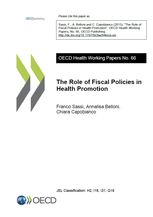OECD Health working paper:
Tax alcohol for health
A recent working paper "The Role of Fiscal Policies in Health Promotion" concludes that the arguments in support of taxes being used to attain public health objectives are strong for tobacco products and alcoholic beverages.
The Organisation for Economic Cooperation and Development (OECD) released a health working paper on 11 December on "The Role of Fiscal Policies in Health Promotion". The paper discusses taxes and other fiscal measures on health-related commodities such as alcoholic beverages, tobacco products and foods high in salt, sugar or fat. According to the paper by OECD staff Franco Sassi, Annalisa Belloni and Chiara Capobianco traditionally, commodity taxes have been primarily seen as a source of fiscal revenues and a way to address consumption externalities. More recently, an increased emphasis has been placed on the potential health benefits of commodity taxation, as evidence emerged of the adverse public health, social and economic consequences of the consumption of a range of commodities.
Analysing of impacts of taxation on consumption and health as well as other impacts, the report concludes that the arguments in support of taxes being used to attain public health objectives are strong for tobacco products and alcoholic beverages, but less clear-cut for foods, in which case the value of using taxes is highly dependent on their design and on the context in which they would be applied.
RELATED ARTICLES
- New report highlights benefits of policy measures to prevent harmful alcohol consumption
- Alcohol use - a barrier to health and to the achievement of the SDGs
- Government investments in alcohol industry up against the wall
- Abstracts for GAPC 2020 – deadline 29 July 2019
- A regional African alcohol coordination mechanism is needed
- New book reveals a series of unethical business practices by Heineken in Africa
- Next GAPC to be held in Dublin in March 2020
- SAFER – a new WHO initiative to boost national alcohol policy processes
- Trouble Brewing
- WHO Launches Global status report on alcohol and health 2018

